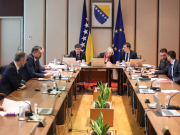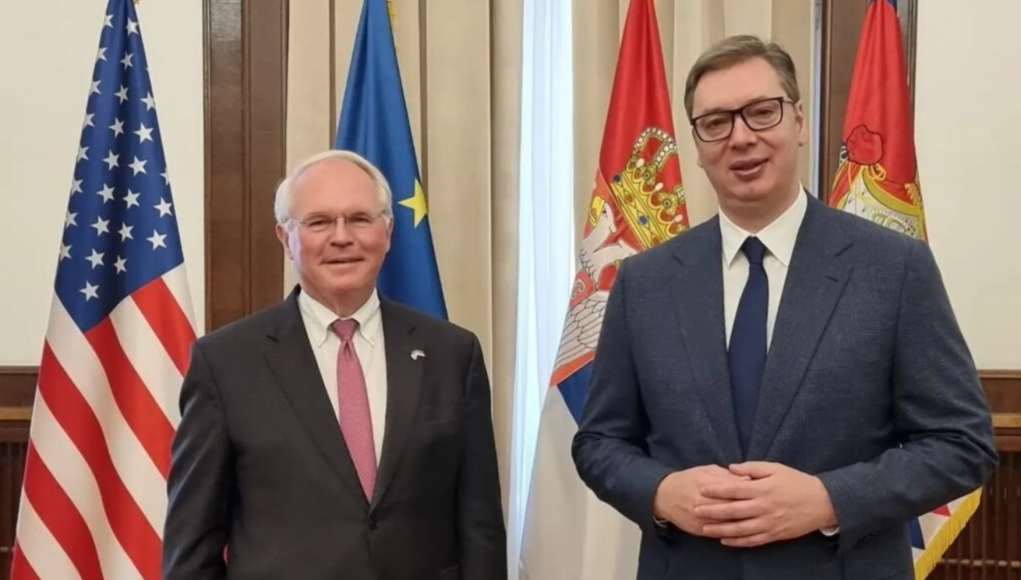Washington and Brussels claim that by courting Serbian President Aleksandar Vučić they are weaning him away from Moscow and creating a common front against the Putin regime. However, the evidence demonstrates the exact opposite. Every concession to Belgrade or lack of accountability for its provocative actions encourages the Kremlin. Russian officials calculate that the West has a soft presence in the Balkans and will continue to concede ground to avoid violence. And perversely, it is the policy of appeasement that is much more likely to lead to armed conflict.
The Kremlin views the Western Balkans as a strategic asset that expands Russia’s geopolitical reach, fractures Western cohesion, and undermine Euro-Atlantic institutions. Fomenting disputes contributes to unsettling the region and dividing international responses. Unresolved conflicts also enable the Kremlin to claim that despite its expansion NATO has failed to stabilize the peninsula. Moscow also seeks to discredit and weaken the US presence while gaining allies that depend on its diplomatic support and financial corruption. In pursuing these strategic objectives, Moscow helps promote Serbian nationalism and expansionism.
American and EU diplomats display a lack of understanding of Russia’s goals and strategies. They define Moscow’s involvement simply as “meddling” rather than as subversion with a destructive purpose. As a result, they assist Moscow through their consistently misfiring policies. In the case of Serbia, they avoid publicly criticizing Vucic’s authoritarianism and threats to Kosova’s security and thereby raise his stature in Moscow as the primary regional disruptor.
Over recent weeks, Belgrade has been allowed to build up its military along Kosova’s border, threaten armed intervention in alleged defense of the Serbian minority, recruit militants and hooligans to attack NATO peacekeepers, Kosova officials and local journalists, and kidnap Kosova’s police officers. The response from Washington and Brussels has been tepid, thus encouraging further provocative acts that can result in casualties.
Instead of pressing Belgrade by deploying strong diplomatic and economic sanctions, Western envoys seem determined to please Putin by blaming the unrest on the government in Prishtina. They naively fail to realize that attacking Kosova for implementing its own constitution on its entire territory not only weakens the state but also directly helps Moscow by discrediting years of US democracy promotion and state building.
About 15,000 Serbs in four northern Kosova municipalities, out of a total Serbian population of some 96,000, boycotted the municipal elections in April 2023. As a result, ethnic Albanian and Bosniak candidates were elected with a low local turnout. The US State Department declared the elections as consistent with Kosova’s constitutional and legal requirements but then backtracked when Belgrade incited violence by claiming the results were not a long-term political solution. Washington also accused Prishtina of provoking violence instead of pinpointing the true source of the clashes – gangs hired by Serbia’s security agencies. The net result was to embolden further anti-state actions and remove the spotlight from the only long-term solution – mutual recognition between Serbia and Kosova.
US ambassador to Pristina, Jeffrey Hovenier, even declared that Washington would apply sanctions against Kosova following the Serbian unrest, including the cancellation of Prishtina’s participation in the US-led “Defender Europe 2023” military exercise. In other words, US policy makers are now excluding Kosova from a security umbrella that Moscow wants dismantled. The ambassador also asserted that the US would cease all efforts to assist Kosova in gaining recognition from the five remaining EU states and halt the process of integration into international organizations. The EU Commission further gifted Moscow by planning to suspend funds, high level visits, and any work on the SAA Agreement with Kosova.
Pressure by Western diplomats on Prishtina to establish an Association of Serb Municipalities will further erode the authority of the central government and increase Belgrade’s involvement in disrupting Kosova’s institutions. It will give Moscow another inroad in the region similar to the RS entity in Bosnia-Herzegovina. Washington and Brussels are also helping the greater Serbia project by largely ignoring civil and minority rights outside of Kosova. Nearly 100,000 Albanians form large majorities in two municipalities in the Preševo valley but have far fewer rights than Serbs in Kosova and are increasingly subject to government pressures.
In the case of Bosnia-Herzegovina, permitting unilateral election changes by the High Representative helps ethno-nationalists, deepens grievances, and encourages separatism. It appears that Western envoys are now supporting the strategy of Russian officials who are determined to keep Bosnia weak, divided, and unqualified for NATO or the EU. They are also enticing Milorad Dodik to devise new moves toward secession. For instance, as with the Serb boycott of Kosova’s elections he can withdraw all Serbian officials from state-wide institutions and declare the entity government in Banja Luka as the only legitimate sovereign institution in the RS. A weak response from Washington will then be seen as another green light on the road to secession.
By centering US policy on Belgrade at the cost of its neighbors, Washington is repeating its mistakes toward Russia. In placating Moscow at Kyiv’s expense and failing to provide either sufficient military deterrence or NATO membership for Ukraine, Washington encouraged Russia’s invasion. A similar scenario is now unfolding in the Western Balkans where Kosova and Bosnia are pressured to surrender their sovereignty.
Vučić may allow old stocks of ammunition to be sent to Ukraine to placate Washington, but he constantly mocks US/EU diplomats and officials in his Russia connections. He regularly sends his ministers to meet with Russian counterparts, signs energy deals and other economic contracts, and allows Serbia to be used as the center for Russian intelligence gathering and anti-Western information wars. At the same time, Washington ignores Vučić’s corrupt criminal connections and fails to censure him for his close relations with Russia’s ruling war criminals. Such misguided policies will simply embolden the Kremlin to maneuver Vučić into further destabilizing the region.
































